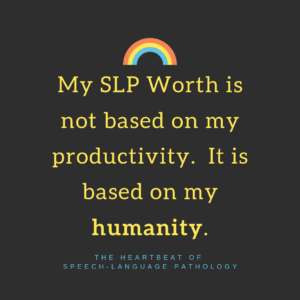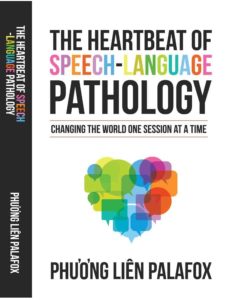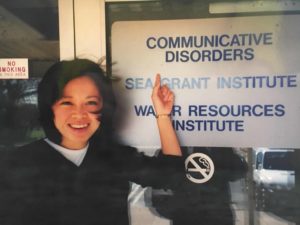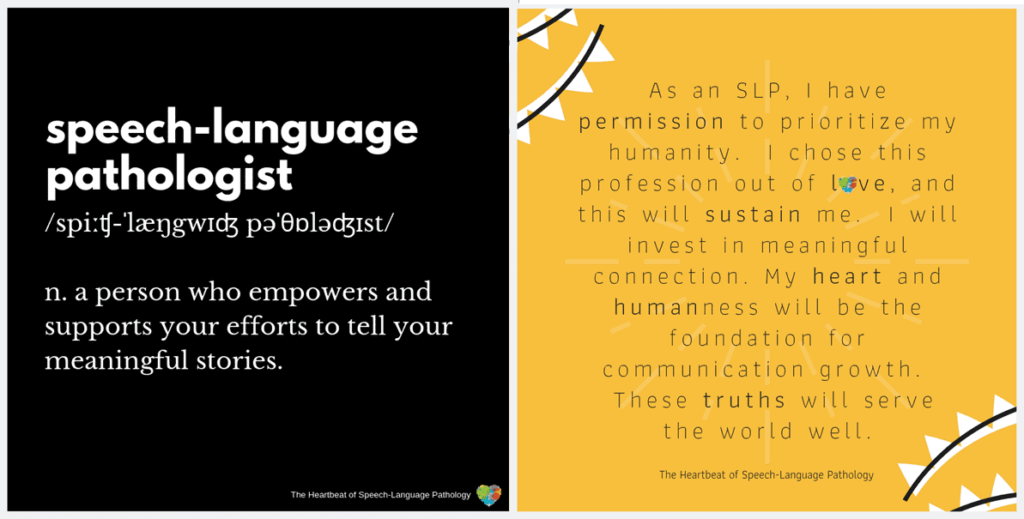 The Hope in Being a Speech-Language Pathologist
The Hope in Being a Speech-Language Pathologist
Here I am smiling despite the impending Wisconsin winter. In this picture, I was a first year graduate student at UW-Madison. My excitement for becoming a speech-language pathologist was sizable. This 22-year-old grin represented the opportunities to help people on their communication journeys. I would be a part of the magic that would help others find their sounds, form their words, express their thoughts and tell their stories. I knew, in my heart-of-hearts, that the relationships developed would serve both me as the clinician and my students/clients well.
The Grind in Being a Speech-Language Pathologist
Fast forward two years, and I earned my diploma. Then, the veil of reality settled in much too quickly as I began working. My days were fueled by making sure therapy minutes were accounted for, due dates were met and scheduling was confirmed. Compliance tasks surely reigned, and anxiety fueled my roles and responsibilities as an SLP. As my path bestowed me the opportunity to support my fellow SLPs, I realized, in recent years, there has been an upsurge in these heavy feelings in being a speech-language pathologist. Despite the increased workload and exhaustive efforts given to paperwork, I continue to find the most solace in the faces and moments with my students and clients. So, I have relied on them for my professional peace. Truth be told, this is not enough.
The Missing Piece in Being a Speech-Language Pathologist

The Path Forward
I have said over and over that the woes of our profession are not caused by people. It is not a people problem. It’s a systems problem, and positive change happens slowly. In the meantime, I whole-heartedly believe that the answer to sustaining ourselves in this profession and finding the joy in our work is remembering to focus on the people. It is truly seeing the person sitting across the U-shaped table and valuing his human needs. It is taking the time to build connections and rapport before diving into an evaluation or goals. It is communicating with families and caretakers because it’s what builds trust. These are the things that make a difference in the lives we serve. There’s more, SLPs. I’m not done.
Then, there’s YOU. I am giving you permission to prioritize your humanity. You chose this profession out of love, and this will sustain you. You will invest in meaningful connections. Your heart and humanness will be the foundation for communication growth. These truths will serve the world and you well.
The Heartbeat of Speech-Language Pathology

This book will provide effective evidence-based strategies to use across professional settings, content on family-centered practice, resources for supporting our diverse populations and well-earned lessons for your career. Thank you to friends who have shared their kind words regarding this work:
“Phuong Palafox finds the beat to touch our SLP-hearts. She honors us with her stories in a way that opens us up to our own–all so that we can assist our clients with the most important thing of all: communication.” – Judy Rudebusch Rich
“Phuong Palafox has captured lightning in The Heartbeat of Speech-Language Pathology: Changing the World One Session at a Time. I’m currently at the beginning of my 6th year working as a speech-language pathologist, and this book left me with both a boost of confidence and reassurance, while also wishing I had been able to read these words when I was first starting out.” – Max J. Pell
“There are also practical strategies for therapy in various areas, and Phuong cites research to support them. Honestly, I’ve not seen a book that manages to touch both my mind and my heart like this book did. When you need that shot in the arm to just keep going, reach for this warmly written book that shines with grace and love.” – Dr. Celeste Roseberry-McKibbin
The Heartbeat of Speech-Language Pathology will be available to the public on September 1, 2019. We’re offering our community the opportunity to purchase it in advance and receive a bonus of two graphics (heARTistry!) created by Phuong.


 The Hope in Being a Speech-Language Pathologist
The Hope in Being a Speech-Language Pathologist


Thank you for your heartfelt words. One of the main “problems” is that we have allowed our scope of responsibilities to become way too broad. When you think about, you can literally call anything “communication”. We have to begin to clearly define our roles and narrow our scope. First and foremost we need to step out of the realm of behavior management. Yes there is a communication aspect of behavior, BUT mainly it is behavior, not communication. We need to separate clinical speech therapy from school based speech therapy. We cannot give every student with a singular sound error (R) an IEP or speech therapy. Most of all -SLPs have to learn how to say NO. We have to give more weight to child’s total communication, not how they scored poorly on one subtest. The total communication score is more important than 1 subtest. If they bomb one subtest but have a total communication SS of 85- guess what? They are compensating for their areas of weakness in other ways and they will manage just fine. From my experience, SLPs are their own worst enemy. Stop allowing everything under the sun to fall under the scope of our profession and start saying NO a lot more. There are so many kids who actually need help, and we lessen our impact on those kids by trying to save every child on the planet with what someone wants to label “communication disorder”.
Hi Peter,
I appreciate the various layers of consideration when it comes to serving our students. I agree with you–SLPs are doing a lot. In terms of “behavior” versus “communication,” the two arenas do overlap, and piecing apart the needs require assessments with positive behavioral supports, visual supports and structural boundaries. I have seen SLPs differentiate well. I also acknowledge that the training and experience to do this is not necessarily provided within educational school districts. With regard to saying “no,” there is surely truth in your sentiments, as well. We need to hold our boundaries. With all things, there are factors that make this difficult. I can speak for myself–saying “no” is hard. Factors include campus philosophies, district procedures, parent requests, etc. I’ll conclude by saying that there is much to think about, we are doing the best we can and we will work toward preserving our efforts (and health) for the individuals we are privileged to serve. Thanks so much for taking the time to write, Peter.
I appreciate the heartfelt sentiments of this author. As a new SLP, it helps to know it’s not just me feeling the grind, wondering what happened to the idea I had about dedicating my life to helping people communicate, and trying to figure out how to focus more on human connections than the demands of paperwork and compliance. As for the reply/post about the boundaries of our scope of practice, and saying no, I completely agree but I think it’s not feasible for us newbies to draw that line in the sand. For now I’m hoping more experienced SLPs, like the author, set those boundaries so that we can support them and maintain them as the profession continues to grow.
Hi Anne,
I appreciate your honest sentiments. It surely is a balance between performing our professional tasks AND maintaining the humanity in all of it. For the time being, I find solace in being reminded that we are in a role that supports real people with real feelings and important needs. We see the whole person. I honor that there are many details related to compliance and paperwork, and I will do that, too. However, I am choosing to prioritize my humanity.
Also, you speak brilliantly to the privilege we have as veteran SLPs. I remember starting out, and it’s hard. It’s hard to keep up. It’s hard to speak up. So, those of us with more time on our side will responsibly carry the load of paving a newer and better path for all of us. I thank you for your words, and I welcome you to the field. We will keep one another afloat. I love my SLP village. Thank you for being a part of mine.
Take care,
Phuong
Just want you to know that as an SLP with over 25 years of experience, the same challenges still apply, so do NOT feel alone!
AMEN!!!
Thanks for writing this blog it is very useful for me. I would like to thank you for the efforts you have put in writing this blog.
Hi Lilly! We are glad this blog has served you well.